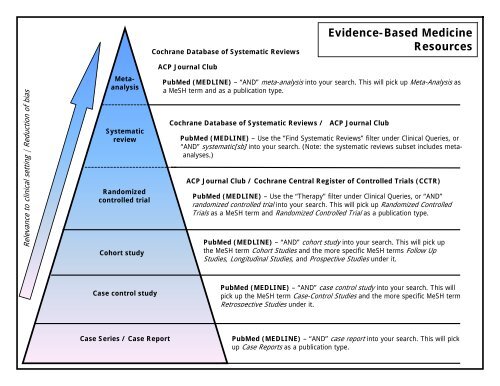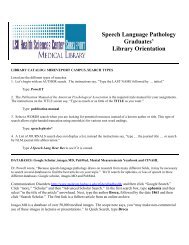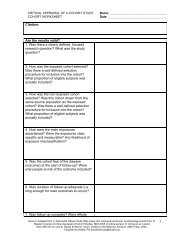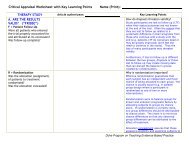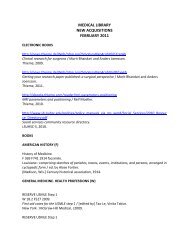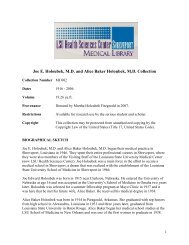Evidence-Based Medicine Resources - Duke University Medical ...
Evidence-Based Medicine Resources - Duke University Medical ...
Evidence-Based Medicine Resources - Duke University Medical ...
Create successful ePaper yourself
Turn your PDF publications into a flip-book with our unique Google optimized e-Paper software.
Cochrane Database of Systematic Reviews<br />
<strong>Evidence</strong>-<strong>Based</strong> <strong>Medicine</strong><br />
<strong>Resources</strong><br />
Relevance to clinical setting | Reduction of bias<br />
Metaanalysis<br />
Systematic<br />
review<br />
Randomized<br />
controlled trial<br />
Cohort study<br />
ACP Journal Club<br />
PubMed (MEDLINE) – “AND” meta-analysis into your search. This will pick up Meta-Analysis as<br />
a MeSH term and as a publication type.<br />
Cochrane Database of Systematic Reviews / ACP Journal Club<br />
PubMed (MEDLINE) – Use the ”Find Systematic Reviews” filter under Clinical Queries, or<br />
“AND” systematic[sb] into your search. (Note: the systematic reviews subset includes metaanalyses.)<br />
ACP Journal Club / Cochrane Central Register of Controlled Trials (CCTR)<br />
PubMed (MEDLINE) – Use the “Therapy” filter under Clinical Queries, or “AND”<br />
randomized controlled trial into your search. This will pick up Randomized Controlled<br />
Trials as a MeSH term and Randomized Controlled Trial as a publication type.<br />
PubMed (MEDLINE) – “AND” cohort study into your search. This will pick up<br />
the MeSH term Cohort Studies and the more specific MeSH terms Follow Up<br />
Studies, Longitudinal Studies, and Prospective Studies under it.<br />
Case control study<br />
PubMed (MEDLINE) – “AND” case control study into your search. This will<br />
pick up the MeSH term Case-Control Studies and the more specific MeSH term<br />
Retrospective Studies under it.<br />
Case Series / Case Report<br />
PubMed (MEDLINE) – “AND” case report into your search. This will pick<br />
up Case Reports as a publication type.
COMMON TYPES OF QUESTIONS:<br />
Therapy -- how to select treatments to offer patients that do more good<br />
than harm and that are worth the efforts and costs of using them<br />
Diagnostic Test -- how to select and interpret diagnostic tests, in order to<br />
confirm or exclude a diagnosis, based on considering their specificity,<br />
sensitivity, likelihood ratios, expense, safety, etc.<br />
Prognosis -- how to estimate the patient's likely clinical course over time<br />
and anticipate likely complications of disease<br />
Harm/Etiology -- how to identify causes for disease (including iatrogenic<br />
forms)<br />
Prevention -- how to reduce the chance of disease by identifying and<br />
modifying risk factors and how to diagnose early by screening<br />
Cost-Analysis -- how to compare the cost and consequences of different<br />
treatments and tests<br />
Type of Study Suggested best type of Study<br />
Therapy RCT (Randomized Controlled Trial)<br />
Diagnosis Test prospective, blind comparison to a gold standard<br />
Prognosis cohort study > case control > case series<br />
Etiology/Harm RCT> cohort > case control > case series<br />
Prevention RCT > cohort study > case control<br />
Cost-analysis economic analysis<br />
Note: Questions of therapy and prevention, which can best be answered by<br />
an RCT, can also be answered by a meta-analysis or systematic review.<br />
TYPES OF STUDY DESIGNS:<br />
A Meta-analysis takes a systematic review one step further by<br />
combining all the results using accepted statistical methodology.<br />
Systematic Reviews usually focuses on a specific clinical question and<br />
conducts an extensive literature search to identify studies with sound<br />
methodology. The studies are reviewed, assessed, and the results<br />
summarized according to the predetermined criteria of the review<br />
question.<br />
Randomized, controlled clinical trials. A prospective, analytical,<br />
experimental study using primary data generated in the clinical<br />
environment. Individuals similar at the beginning are randomly allocated<br />
to two or more groups (treatment and control) and the outcomes of the<br />
groups are compared after sufficient follow-up time.<br />
A study that shows the efficacy of a diagnostic test is called a<br />
prospective, blind comparison to a gold standard study. This is a<br />
controlled trial that looks at patients with varying degrees of an illness and<br />
administers both diagnostic tests -- the test under investigation and the<br />
"gold standard" test -- to all of the patients in the study.<br />
Cohort studies identify a large population who already has a specific<br />
exposure or treatment, follows them over time (prospective), and<br />
compares outcomes with another group that has not been affected by the<br />
exposure or treatment being studied. Cohort studies are observational and<br />
not as reliable as randomized controlled studies, since the two groups may<br />
differ in ways other than in the variable under study.<br />
Case control studies are studies in which patients who already have a<br />
specific condition or outcome are compared with people who do not.<br />
Researchers look back in time (retrospective) to identify possible<br />
exposures. They often rely on medical records and patient recall for data<br />
collection. These types of studies are often less reliable than randomized<br />
controlled trials and cohort studies because showing a statistical<br />
relationship does not mean than one factor necessarily caused the other.<br />
Case series and Case reports consist of collections of reports on the<br />
treatment of individual patients or a report on a single patient. Because<br />
they are reports of cases and use no control groups with which to<br />
compare outcomes, they have no statistical validity.<br />
<strong>Duke</strong> <strong>University</strong> <strong>Medical</strong> Center Library | December 2005


